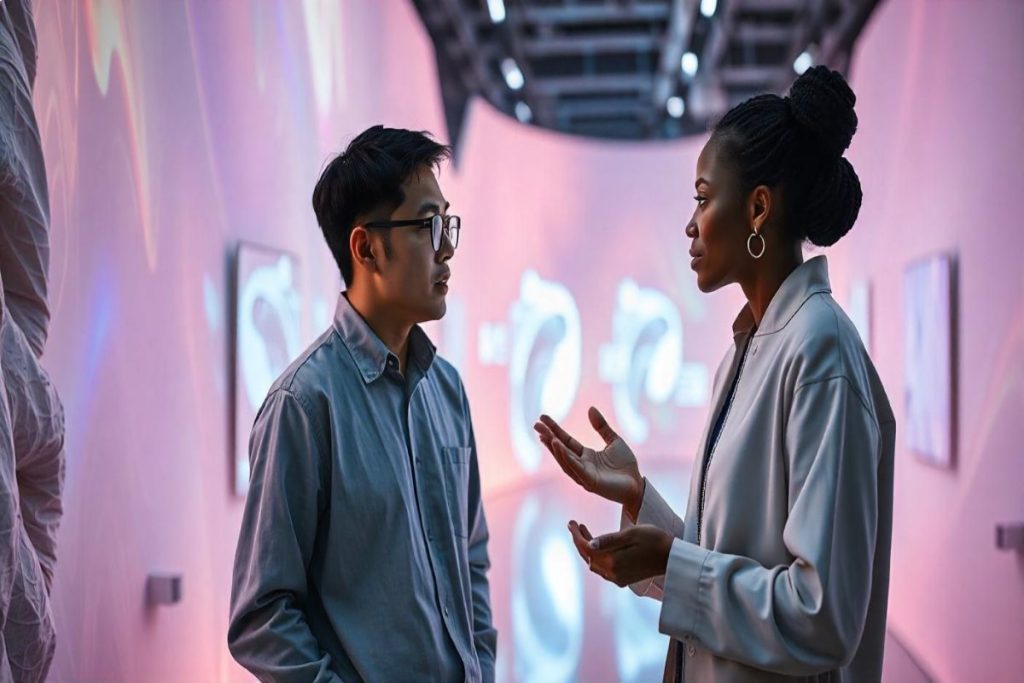Social media ennui is creeping into the digital lives of many users, as the excitement of sharing mundane moments fades into disinterest. With the rise of curated content and a focus on influencer lifestyles, casual posting feels somewhat out of place in today’s social media culture. Users often grapple with social media anxiety, fearing the judgment that may accompany every photograph or status update. Gone are the days of innocent breakfast pictures; now, the pressure to engage meaningfully competes with the anxiety of overexposure. In a landscape dominated by polished aesthetics and incessant posting habits, the charm of spontaneity is all but lost, leaving many feeling disconnected from their online communities and questioning the value of their contributions.
The phenomenon of social media fatigue, often articulated as a lack of enthusiasm for online sharing, highlights a significant shift in how individuals interact with digital platforms. While once we reveled in posting snapshots of our lives, many now feel a disconnect from this once-familiar practice, leading to a retreat into more private or limited social networks. With the emphasis on curated content and polished images, the casual joys of sharing everyday experiences have been sidestepped by an anxiety surrounding public perception and curated personas. This change reflects broader trends in digital culture, where the pursuit of validation has morphed into a pressure-filled endeavor that discourages authenticity. As individuals navigate their posting habits, the landscape of social media continues to evolve, pushing for more than just a casual connection but rather an investment in personal branding and careful curation.
Understanding Social Media Ennui
Social media ennui is a concept that many users are starting to grapple with as platforms evolve beyond their original intent. What began as a space for casual sharing and genuine connection has morphed into a highly curated ecosystem dominated by influencers and professional content creators. This shift has led to a sense of dissatisfaction among everyday users who feel pressure to conform to rising expectations of quality and engagement. As casual posting gives way to polished content, many have begun to question their role in this digital culture, leading to a decrease in spontaneous sharing.
The feelings of disconnection from social media are palpable, with users like Kanika Mehra articulating a sense of voyeurism, where scrolling replaces active posting. This sentiment echoes the experiences of various generations grappling with social media anxiety—anxiety fueled by the fear of not being seen or adequate within the online landscape. As personal moments become overshadowed by bombastic posts and sensational content, users begin to experience a fatigue that could redefine how social media is engaged with in the future.
The Evolution of Posting Habits
Over the years, posting habits on social media have undergone a seismic shift. Initially, users celebrated the spontaneity of sharing fleeting moments, like a breakfast photo, leading to a rich tapestry of casual content. The overwhelming accessibility of social media democratized this sharing, inviting anyone with a smartphone to partake in creative expression. However, as digital culture increasingly favored influencer-driven narratives, the focus shifted towards highly polished images, often curated for maximum engagement. This evolution has led many casual users to retreat from sharing their own lives.
As a result, social media platforms now present a landscape where casual posting is often viewed as impractical. The pressure to craft content that fits algorithmic preferences forces users into a cycle of self-censorship, leading to less authentic engagement. Rather than expressing themselves freely, users like Tarik Bećarević carefully curate their images, striving for an ironic take on casualness, fearing backlash from their peers. This intricate dance of curation reflects a deeper cultural shift where the joy of casual sharing is often overshadowed by concern for perception and digital reputation.
The Rise of Influencers and the Impact on Sharing
The emergence of social media influencers has significantly altered the landscape of content sharing. No longer just platforms for personal expression, social media sites have become breeding grounds for professionals marketing their curated lives. As influencers set the standard for communication, they not only elevate expectations but also commodify authenticity—what once felt spontaneous now feels like a calculated brand strategy. This transition encourages everyday users to compare their lives against attainable yet unrealistic lifestyles, inducing feelings of inadequacy and prompting many to opt out of posting altogether.
Moreover, the platform algorithms actively promote influencer content over user-generated posts, creating an echo chamber where casual moments struggle to gain visibility. Users feel disheartened when their personal updates don’t receive the same traction as influencer content, contributing to social media anxiety. This environment discourages genuine connection, as people become more aware of how their posts are perceived and the kinds of attention they receive. The focus shifts from sharing experiences to curating an aesthetically pleasing feed, sowing the seeds for social media ennui.
Navigating Privacy in the Age of Social Media
As users grow increasingly cautious about oversharing, particularly in light of global events, the concept of digital privacy has evolved significantly. For millennials and Gen Z users who have witnessed the fallout from past oversharing, there is an inherent tension between wanting to connect and safeguarding personal information. This caution can lead to a more inward trajectory, where individuals retreat from public platforms and seek solace in private conversations, leading to a decline in the casual interactions that once characterized early social media.
The dichotomy between public and private lives on social media creates a complex emotional landscape. While some users fear appearing insensitive amid global crises by posting personal updates, others restrict themselves to tight-knit circles where authenticity is encouraged. This ongoing evaluation of what is acceptable to share amplifies social media anxiety, as individuals navigate how to express themselves within the constraints of a judgmental environment. In this climate, privacy becomes a priority, and casual posting takes a back seat to self-preservation.
The Psychological Effects of Social Media
The creeping sensation of social media ennui can also be linked to psychological effects that arise from constant engagement with curated feeds. Users today find themselves inundated with imagery and narratives designed to provoke emotion or inspire envy, resulting in a cycle of comparison that can contribute to lower self-esteem. As a coping mechanism, many individuals have chosen to disengage from posting or limit their use of social media altogether, opting for a more mindful approach to how they consume content and interact online.
The rise of social media anxiety among users further complicates their relationship with these platforms. Posting can elicit feelings of vulnerability, particularly when unsure how the audience will perceive personal experiences. This uncertainty often leads to self-censorship or an avoidance of personal content altogether. Instead, brief updates or curated posts become the norm, perpetuating a cycle where authentic sharing is sacrificed for social media’s performative aspects.
Adapting to New Social Media Trends
In the wake of evolving social media trends, users are faced with the challenge of adapting their posting habits to remain relevant. The rapid rise of platforms like TikTok emphasizes the necessity for users to engage in digital culture on their terms, blending creativity with the demands of algorithm-driven visibility. However, this need to adapt raises questions about authenticity and the purpose of social sharing, leading some to experience a profound disconnection from their original intent.
As individuals learn to navigate this new landscape, the role of personal expression becomes increasingly important. Finding joy in casual posting, rather than succumbing to the pressure of influencer culture, might reclaim the authenticity that many feel is missing. For those determined to embrace their personal narratives, the challenge lies in balancing creativity with self-acceptance, fostering a digital environment that honors the nuances of everyday life.
The Future of Casual Sharing
As we move towards a potential ‘Posting Zero’ scenario, where casual sharing may become obsolete, it’s essential to consider what this means for the future of social media. The idea of everyday users stepping back from posting highlights a shift towards professionalization of digital content, potentially stripping platforms of their vibrancy and authenticity. With less personable content crowding users’ feeds, social media could transform into a sterile space dominated by corporate marketing and influencer-sponsored posts.
However, there’s still hope for casual sharing to reclaim its place within social media. By encouraging an environment where spontaneous expression is celebrated rather than scrutinized, users might rekindle their enthusiasm for sharing. This evolution could redefine social media, allowing individuals to connect through the mundane once again. Ultimately, the drive to simplify and embrace genuine interaction could pave the way for a renewed appreciation of everyday life in the digital sphere.
Fostering Authentic Engagement
Understanding the importance of authentic engagement on social media can help combat feelings of ennui and anxiety. Communities that embrace vulnerability and everyday experiences invite individuals to connect more deeply, offsetting the pressures of curated content. Encouraging genuine dialogue around mundane moments can reinvigorate interaction on platforms traditionally overshadowed by influencer activity, creating spaces where casual sharing thrives once again.
To cultivate this type of engagement, users can focus on fostering quality conversations, supporting one another’s unique expressions, and celebrating the ordinary. By prioritizing authentic communication over the allure of perfection, users can challenge the status quo of digital interactions. In doing so, they craft environments that resonate with the essence of social media—connecting individuals through shared experiences and stories, rather than competing for likes and visibility.
Finding Balance in Digital Consumption
As users grapple with social media ennui, finding balance in digital consumption becomes vital. A conscious approach to engaging with social media may enhance the overall experience and mitigate feelings of inadequacy stemming from curated feeds. By reducing time spent scrolling through platforms focused on commerciality, individuals can redirect their energy towards more organic, uplifting interactions that prioritize connection over comparison.
In pursuing balance, users might consider setting boundaries around their social media use, dedicating time to engage with uplifting content or interests outside of these platforms. This shift not only nurtures mental well-being but revitalizes the social media experience, allowing for a healthier relationship with online interactions. Ultimately, the aim is to foster digital spaces that celebrate humanity and connection rather than perpetuate isolation or comparison.
Frequently Asked Questions
What causes social media ennui among users?
Social media ennui often stems from the pressure of high expectations and an oversaturation of polished content from influencers. Users may feel overwhelmed by the need to create an engaging online presence, leading to anxiety about posting. Additionally, concerns over privacy and the perception of insensitivity amidst global issues contribute to this sense of ennui, causing many to retreat from casual sharing.
How can I overcome social media anxiety related to posting?
To overcome social media anxiety, consider shifting your focus from follower counts and likes to enjoying the act of posting itself. Embrace the idea of casual posting that reflects your authentic self, rather than striving for perfection. Setting boundaries on usage and engaging in small, personal shares can help ease the pressure and rekindle your enjoyment of digital culture.
What are the effects of digital culture on posting habits?
Digital culture has evolved to prioritize highly curated content, leading to increased pressure on users to present a polished image. This shift has resulted in many individuals feeling less inclined to share mundane moments of their lives, contributing to social media ennui. As a result, many users now opt for minimal or highly selective posting, impacting the authenticity of online interactions.
Why has casual posting significantly declined on social media?
Casual posting has declined due to the rise of social media influencers and the expectation for high-quality content. As platforms have evolved, the emphasis has shifted towards professionally produced posts, making ordinary updates seem less appealing. Users often feel their casual moments will go unnoticed, leading to a decrease in spontaneous sharing and contributing to overall posting ennui.
What are the consequences of posting ennui on social media engagement?
Posting ennui can lead to decreased engagement on social media platforms, as users may choose to scroll without posting. This disengagement creates an environment where casual interactions diminish, favoring only those who adhere to popular trends or polished content. The lack of everyday user participation can result in a more homogenized online experience, affecting community dynamics.
How do younger generations experience social media ennui differently?
Younger generations, such as Zoomers, often experience social media ennui through a mix of voyeurism and self-consciousness about posting. Many report feeling overwhelmed by the curated nature of online content, leading to a reluctance to share their lives. This generational shift highlights a growing aversion to traditional casual posting, as young users navigate a landscape dominated by influencer culture.
What role do algorithms play in social media ennui?
Algorithms play a significant role in social media ennui by prioritizing popular content over casual, personal updates. When users realize their posts may not reach their intended audience, they may become discouraged from sharing altogether. This dynamic creates a cycle where individuals feel compelled to produce content that aligns with algorithmic preferences, further stifling casual expression.
How can we shift back to a more casual social media culture?
To shift back towards a casual social media culture, we can encourage authentic sharing by celebrating ordinary moments regardless of their perceived value. Users should strive to embrace the essence of community, engaging with friends’ posts and supporting relationships over metrics. Creating spaces for genuine interactions may help revive the spontaneity of casual posting and lessen feelings of ennui.
| Key Points |
|---|
| Social media posting ennui is the feeling of disinterest or fatigue with casual personal sharing on platforms like Instagram and Twitter. |
| Initially, sharing mundane moments, like breakfast photos, was a novel and engaging phenomenon that fostered connection. |
| Over time, an influx of influencers, polished content, and algorithm-driven feeds pushed casual users to the sidelines, affecting their willingness to share. |
| Younger generations, like Zoomers, report feeling like voyeurs who scroll without posting, fearing vulnerability and disconnection. |
| The pressure to create high-quality content has led many users to retreat from casual posting due to rising expectations. |
| Social media’s design discourages casual posts, prioritizing popular content over personal updates, causing people to feel invisible. |
| Current global events create a dilemma for individuals deciding whether to post personal updates or remain silent due to potential insensitivity. |
| Many users still post for personal enjoyment, seeking catharsis rather than engagement or validation from others. |
Summary
Experiencing social media ennui is becoming increasingly common, as users question the relevance of sharing personal moments in a landscape dominated by polished content and global crises. Once a platform for casual sharing, social media now feels like a high-pressure environment where only curated lives are celebrated. In this complex climate, many are choosing to scroll silently, reflecting a broader societal shift towards privacy and introspection. As posting becomes less about connection and more about strategy, we must ask ourselves: what truly brings us back to social media?



